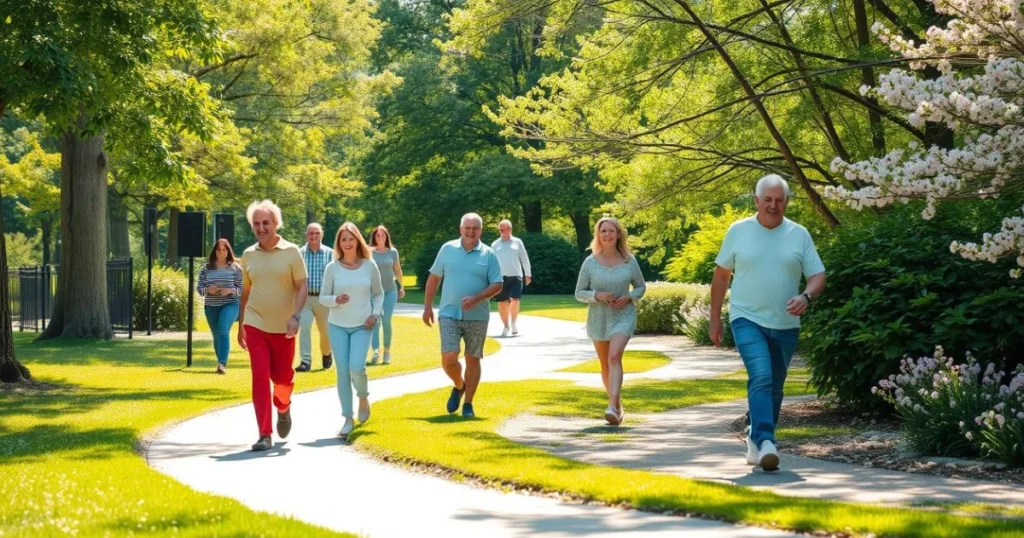Top Health Benefits of Walking: Feel Better Naturally
As the morning sun peeked through the curtains, I laced up my sneakers, ready to start my daily walk. The soft crunch of the pavement and the gentle breeze lifted my spirits. Walking has become a cherished part of my life, offering many health benefits.
Whether you love fitness or want to be more active, walking is great. It boosts your heart health, improves your mood, and reduces stress. Let’s explore how walking can make you feel better and happier.
Table of Contents
Understanding the Power of Daily Walking
Walking is a simple yet powerful exercise that can greatly improve your health and well-being. Regular walking changes your body in many ways. These changes lead to several benefits of daily walks.
What Happens to Your Body When You Walk
When you start walking regularly, your heart beats faster. The result is an increase in oxygen and blood flow to the muscles. It also makes your heart stronger, lungs work better, and blood pressure more stable.
Walking also works many muscle groups. Your legs, core, and upper body. It strengthens and tones muscles.
The Science Behind Walking Benefits
Many studies show walking’s big impact on health. It supports overall well-being and may contribute to a healthier lifestyle. Walking also boosts mood, brain function, and sleep quality.
Walking vs Other Forms of Exercise
Walking is special because it’s easy and flexible. To go for a walk, you don’t need any extra gear or a gym. It’s perfect for anyone, anywhere, anytime.
Walking is also gentle on your body. For people who have trouble moving their joints or joints, it’s great. It’s less stressful than high-impact exercises.
Benefits of Walking for Physical Health
Walking regularly can greatly improve your physical health. It helps your heart, builds stronger bones and muscles, and boosts your defense system. These benefits are available to everyone, no matter your fitness level.
Walking is great for your heart. Blood pressure and cholesterol drop with brisk walking. It also strengthens muscles that support your heart, improving circulation and heart function.
Walking also makes your muscles and bones stronger. Increased bone density reduces osteoporosis and fractures. It works your legs, core, and upper body, improving balance and fitness.
- Improved cardiovascular health
- Stronger muscles and bones
- Enhanced balance and coordination
- Boosted immune function
- Reduced risk of chronic diseases
Regular walking also boosts your immune system. It increases blood flow and oxygen, helping to fight off illnesses. This reduces illness.
Adding walking to your daily routine offers many physical benefits. It improves heart health, strengthens muscles and bones, and boosts immunity. The benefits of walking regularly are clear and worth the effort.
| Physical Health Benefit | Description |
|---|---|
| Improved Cardiovascular Health | Regular walking can help lower blood pressure, cholesterol levels, and reduce the risk of heart disease and stroke. |
| Stronger Muscles and Bones | Walking is a weight-bearing exercise that helps maintain and improve muscle strength and bone density. |
| Enhanced Balance and Coordination | Walking improves balance, coordination, and flexibility, decreasing falls and injuries. |
| Boosted Immune Function | The increased blood flow and oxygen circulation during walking helps to stimulate the production of white blood cells, strengthening the immune system. |
| Reduced Risk of Chronic Diseases | Regular walking can help prevent or manage chronic conditions such as type 2 diabetes, certain cancers, and Alzheimer’s disease. |
Walking for Weight Loss and Management
If you want to lose weight, walking might be the answer. There’s no pain or strain involved. Plus, walking for weight loss works well when you eat healthy too.
Optimal Walking Pace for Weight Loss
For the best weight loss, walk at a pace of 3-4 miles per hour. Brisk walking helps to burn energy, which can complement a balanced lifestyle. Try interval training by switching between fast and slow walks to burn more calories.
Combining Walking with Healthy Eating
Walking is great for burning calories, but you also need to eat right. Enjoy fruits, vegetables, healthy grains, and lean proteins. This reduces calories for weight reduction.
Creating a Walking Schedule for Weight Loss
- Walk 30 minutes briskly five days a week.
- As you get fitter, walk longer and faster.
- Do strength training a few times a week to build muscle and speed up your metabolism.
- Keep it up and make walking for weight loss a daily habit.
Walking and eating well can help you lose weight and feel better. So, put on your walking shoes, get out there, and start your journey to a healthier, happier you!
How Walking Improves Heart Health
Adding walking to your daily routine can greatly benefit your heart health. It’s great for those looking to walk for fitness or just wanting to feel better overall. Walking has a huge positive effect on your heart.
Walking can support maintaining healthy blood pressure levels over time. As you walk, your heart gets stronger. This means it can pump blood better, easing the pressure on your arteries. It will show that your blood pressure is going down.
Walking encourages better balance in overall body function. It helps your body use cholesterol better. This means more good cholesterol and less bad. Heart disease and stroke are less likely to happen if your cholesterol levels are better.
| Benefit | Description |
|---|---|
| Lowered Blood Pressure | Walking improves the heart muscle, improving blood pumping and minimizing artery strain. |
| Improved Cholesterol Levels | Walking helps the body metabolize and utilize cholesterol, raising HDL (good) cholesterol and lowering LDL (bad) cholesterol. |
| Reduced Risk of Heart Disease and Stroke | The cardiovascular benefits of walking, including lower blood pressure and balanced cholesterol, contribute to a decreased risk of heart-related conditions. |
Make walking a part of your daily life to support your heart’s health. Whether it’s a quick walk, a hike, or joining a walking group, walking is good for your heart.
Mental Health and Mood-Boosting Effects of Walking
Putting on your shoes and going for a walk can greatly improve your mental health. You can do more good things when you walk. It also helps your mood, reduces stress, and boosts your mental health.
Walking for Stress Relief
In today’s fast world, managing stress is key. It’s good for you to walk around and clear your thoughts. Studies show that regular walking lowers stress hormone levels, improving mood and reducing anxiety and depression symptoms. Whether it’s a quick walk or a hike, walking offers a mental break and helps you find balance.
Walking Meditation Techniques
- Walking with mindfulness boosts mental health even more. Walking meditation, focusing on breath or body sensations, reduces worries and brings peace.
- Adding walking meditation to your day improves well-being and mental health.
Social Benefits of Group Walking
Walking doesn’t have to be alone. Going for walks with a group is good for your mental health. Group walks build community, reduce loneliness, and create meaningful connections, all vital for mental health. Walking with friends or others can add to walking’s mental health benefits.
By using walking’s mental health and mood-boosting effects, you can improve your overall well-being. This simple activity can have profound benefits.
Walking to Enhance Joint Health and Mobility
Walking regularly offers more than just physical fitness benefits. It greatly improves your joint health and mobility. This makes walking a key activity for those wanting to keep or boost their joint function and flexibility.
It’s not too hard on your joints to walk because it has low pressure. Yet, it strengthens the muscles and ligaments around them. This exercise helps keep your joints lubricated, reducing stiffness and pain, especially for those with arthritis. It also lowers the chance of getting osteoporosis, a condition that weakens bones and raises the risk of fractures.
- Enhances joint flexibility and range of motion
- Lowered risk of osteoarthritis and other joint disorders
- Improves balance and stability, lowering fall risk
- Supports healthy bone density and muscle strength

Walking daily improves joint health and mobility. It’s a powerful way to manage health conditions or simply stay well. No question, going for a walk is good for you.
Building a Sustainable Walking Routine
Adding daily walks to your life can boost your health and fitness. But, starting a walking habit can be tough. With a few tips, you can make walking a regular and enjoyable part of your day.
Best Times to Walk
Choosing the best time to walk depends on your schedule and likes. Some like morning walks to kickstart their day. Others enjoy evening walks for peace. Find what fits your life best. Every day, set aside a certain amount of time to go for a walk.
Walking Safety Tips
- Wear proper, comfortable footwear with good traction to prevent injuries.
- Be aware of your surroundings, especially when walking in urban or unfamiliar areas.
- Carry a phone, water, and any necessary medications with you.
- Avoid nighttime walks alone, especially in remote regions.
- Layer clothes for changeable weather.
Essential Walking Gear
| Gear Item | Importance |
|---|---|
| Comfortable Walking Shoes | Provides cushioning and support to prevent foot and joint pain. |
| Moisture-Wicking Clothing | Helps regulate body temperature and prevent chafing. |
| Reflective Gear | Enhances visibility for safety, especially during low-light conditions. |
| Water Bottle | Keeps you hydrated and energized throughout your walk. |
By following these tips, you can make walking a lasting part of your life. It will help you enjoy the many benefits of daily walks and walking for fitness.
Walking for Better Sleep and Energy Levels
Regular Taking walks is good for more than just your body. It also helps improve your sleep and energy. Adding more walking for better health to your day can make you feel refreshed and full of energy.
Walking helps regulate your body’s internal clock. It tires you out, making it easier to sleep at night. Stress and worry can impair sleep, but it lessens them.
The perks of walking for better health don’t end there. It boosts your energy during the day. This is because it improves blood flow, oxygen, and releases endorphins. These changes help fight off tiredness and give you a natural energy boost.
Want to feel more energized and sleep better? Walking 30 minutes a day is recommended. It could be a lunchtime walk, a stroll after dinner, or a hike on the weekends. By making walking a regular habit, you’ll enjoy better sleep, more energy, and a healthier, happier life.

| Benefits of Walking for Sleep | Benefits of Walking for Energy |
|---|---|
|
|
Walking Exercise Benefits for Different Age Groups
Walking is good for everyone, no matter how old you are. It can greatly improve your health and happiness. Let’s see how walking helps people of all ages.
Children and Teenagers
Walking is great for kids and teens. It helps them grow strong and healthy. It boosts their heart, muscles, and bones, and even their brains.
It also helps them love moving and staying active. This is the start of a lifelong love for walking exercise benefits.
Young and Middle-Aged Adults
Walking is key for adults. It helps keep the weight off, lowers disease risks, and eases stress. The benefits of walking for this age include better heart health and a happier mind.
Older Adults and Seniors
Walking is a big help for seniors. It keeps them moving, balanced, and safe from falls. It also helps with arthritis, Alzheimer’s, and Parkinson’s symptoms.
Walking benefits everyone, regardless of age. It boosts your health, mood, and love for nature. Walking improves life easily.
Conclusion
In this article, we’ve looked at the amazing benefits of walking. It’s a simple activity that can greatly improve your wellbeing. Walking boosts your physical health and strengthens your mental and emotional strength.
Walking can help you lose weight, improve your heart health, or reduce stress. Easy to include into daily life. Walking is great for everyone, no matter your age or fitness level.
Starting your walking journey can change your life. Walking has health benefits beyond physical fitness. By walking to improve wellbeing, you’re making a big investment in your life. You’ll feel better, think clearer, and live more fully.
Walk for a better, happier life. Simple but powerful, it can change you.
FAQ
What are the main health benefits of walking?
How does walking affect my body?
How does walking compare to other exercises?
How may walking aid weight loss and management?
How can walking improve my mental health?
How might walking help my joints?
How can I build a sustainable walking routine?
How does walking affect my sleep and energy levels?
How do the benefits of walking differ for various age groups?
Disclaimer:
This article is for informational purposes only and does not replace professional medical advice. For any medical questions, please consult a qualified healthcare professional.

